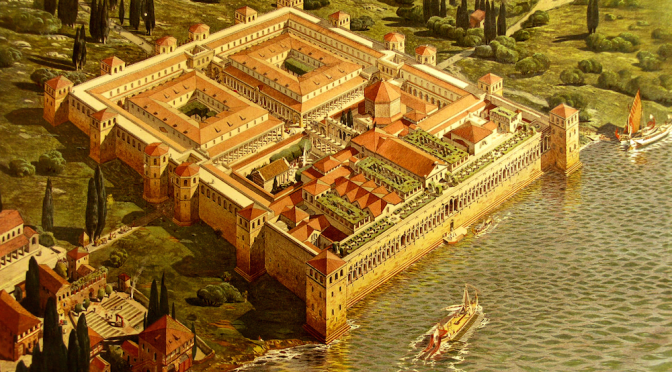Crisis of the third century
From the end of Caracella’s rule until the election of Diocletian, over one hundred years there was great instability. One Emporer, Trajan Decius died in battle against the Goths.His son Hostilian and shortly afterwards Claudius Gothicus died of natural causes (the plague) and one Emperor, Valerian died in captivity and one Carus was struck by lightening.
The remaining twenty one emperors were either assasinated or died in battle with other Roman factions. there is little doubt that much of the instability was prompted by the senate, who were largely removed fom direct control of goverment but still had enough influence to stir up discontent.
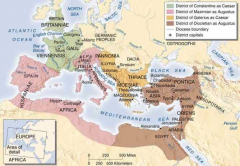 Dioclese was proclaimed emperor in 284. From the East, he immediately changed his name to Diocletian to “Romanise” his image.
Dioclese was proclaimed emperor in 284. From the East, he immediately changed his name to Diocletian to “Romanise” his image.
Not surprisingly Diocletian abandoned all pretences about who ruled the empire . He insisted on being called “Dominus”, which at that time was the title used by a slave when addressing his master.
He appointed Maximian as Emperor in the West and and Maximian established his capital at Tier. He reorganised the empire to totally bypass the administrative structure of the senate and empower himself and his co-Augustus to rule directly.
Dicletion also believed that religious differences were an underlying cause of conflict and that the christians, with their continuous proselytism were the guilty party. He came to believe that the christian influence was seriously disruptive. Although he was personally tolerant of many different beliefs he banned public displays of christian belief.
In an attempt to create a succession with would not be disputed he created Galerius and Constantius Chlorus as junior emperors and gave them the title Caesar. He allocated both caesars different territories to their respective Augustus. A particular fault in this arrangement was that the “empire” of Constantius Chlorus (Brittania and Gaul) had no direct access to grain from either Africa or Egypt.
In Britain Carasius and Allectus led a revolt against Constantius Chlorus which lead to him invading the island, where he was later joined by his son Constantine.
Constantine
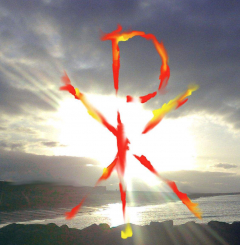 Before the battle of Milvan bridge, during which Emporer Constantine's arm was victorious and his co-Emperor Maxentian was killed, Constantine saw the Chi Rho symbol in the sky and adopted it as his symbol. it appeared on coins and replaced the Eagle on the standards of the Roman Legions. From the greek Chi Rho was then interpreted by the the Church of Rome to mean Cr -Christ. other information however wether this symbol was ever associated with the Church of Rome,It was from Britain that Constantine, acclaimed by the legions in Britain launched his claim to become sole Emperor, earning the title “great”
Before the battle of Milvan bridge, during which Emporer Constantine's arm was victorious and his co-Emperor Maxentian was killed, Constantine saw the Chi Rho symbol in the sky and adopted it as his symbol. it appeared on coins and replaced the Eagle on the standards of the Roman Legions. From the greek Chi Rho was then interpreted by the the Church of Rome to mean Cr -Christ. other information however wether this symbol was ever associated with the Church of Rome,It was from Britain that Constantine, acclaimed by the legions in Britain launched his claim to become sole Emperor, earning the title “great”
His was a long and successful reign during which Christianity was accepted as one of the Roman relgions. he did not however make Christianity the state religion. his coins show clearly his reverence for “sol invictus” and on his deathbed he was baptised as an Arian not a Roman Christian.
Bloodbath
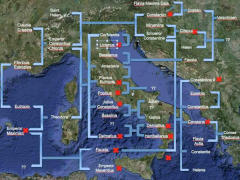 In 340 The Emperor Constans declared worship of the Ancient Roman and Celtic gods illegal. Constans was one of the sons of Constantine the Great and had been Emperor of the West for three years.
In 340 The Emperor Constans declared worship of the Ancient Roman and Celtic gods illegal. Constans was one of the sons of Constantine the Great and had been Emperor of the West for three years.
At this time Constantius, the elder son of Constantine the Great, had been Emperor of the east for thirteen years. Both Constans and Constantius had been complicit in an horrendous bloodbath after Constantine’s death. They killed all their adult relatives thus removing all potential challengers to their positions.
European genealogies indicate that they did not quite succeed The Emperors Julian and Valantinian were descendants of Constantius Chlorus and the Emperor Thedosius was a descendant of Constantine himself.
In 1350 Flavius Magnus Magentius attracted the support of Britannia, Gaul and Hispania in his challenge to the Emperor Constans. Maxantius was a pagan and declared his intention to stop the persecution of those who shared his beliefs.
Constans attempted to flee to Spain but was apprehended and killed whilst trying to cross the Pyrenees.
There is a legend that Constans, during a visit to Britain married Flavia Actia, daughter of Marcus Actius who was either Comes or Governor of Britain in 343. Actia and her children were hidden away in Hispania. This was known and this was why Magentius knew where to look for Constans. Mainstream history does not record this marriage and indeed by identifying that Constans favoured his barbarian bodyguards, suggests Constans was homosexual.
In fact the reason for Constans deposition may well have been his opposition to the ancient religion. The christians wrote an alternative history to conceal the fact that they were nowhere near as strong at that point in time as they later attempted to claim.
Death of the roman armies
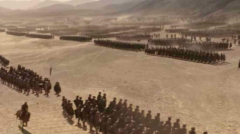 When Constans death was known the army in Pannonia and Moesia then chose Vetranio as Emporer. It is said that this appointment was approved or even encouraged by Contantius and he marched west to give support.
When Constans death was known the army in Pannonia and Moesia then chose Vetranio as Emporer. It is said that this appointment was approved or even encouraged by Contantius and he marched west to give support.
Part of Constantius’ preparation for the conflict was to send an invitation to christian germanic tribes on the frontier asking them to invade Magentius’ strongholds including Britain. He promised that anything they looted during raids they could keep.
In an attempt to consolidate his position Magentius offered to marry Constantia, Constantius’ sister . The request was refused. Constantius defeated Magentius twice, at Mursa Major in Pannonia and then again in 353 at Mons Seucleus in Provence.
Roman losses (both sides) at the battle of Mursa Major alone were estimated at 50,000 men. The battle was particularly fierce because this was not just about who would be emperor. It was about the survival of the tradition religion and the need to defend it against against persecution by the Christians. After the second battle, Magentius commited suicide but not until many soldiers from the Gallic legions had been killed. The Germanic tribes played a minor part in the defeat of Maxentius but the concept introduced to them by Constantius was not forgotten.
Constantius
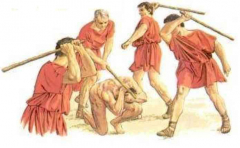 Constantius was now sole Emporer and set out to uncover all those who had supported Maxentius. He selected as his agent Paulus Catena and sent him to Britain. This choice means that at least in Constantius mind, the source of Maxentus’ funding and support lay in Britain.
Constantius was now sole Emporer and set out to uncover all those who had supported Maxentius. He selected as his agent Paulus Catena and sent him to Britain. This choice means that at least in Constantius mind, the source of Maxentus’ funding and support lay in Britain.
Paulus immediately widened his search from supporters of Maxentius to those who worshipped pagan gods. It was Paulus who invented the techniques used so effectively by the inquisition 800 years later, using torture to get brother to testify against brother, husbands to testify against wives.
His methods were so extreme that the Vicarius(Chief minister) for Britain, Flavius Martinus, personally attempted to assasinate Paulius. His attempt failed and Flavius commited suicide.
Paulinus then executed everyone he suspected of worshipping the ancient gods or supporting Maxentius in any other way, without proof, without reason , without justice.
Judging his efforts to be succesful Constantius then sent him to Egypt where the followers of the ancient gods were declared traitors and summarily executed.
Gratianus
In the period immediately before Magentius’ bid for power the Comes Britannae ( the emperor’s representitive in Britain) was Gratianus.
Gratianus had been Comes Africae from 328 to 338 but was accused of embezzlement and compulsorilly retired. He was recalled to Britain in 342.
In the aftermath of Magentius revolt Gratianus estates ( in Pannonia) were confiscated, as Constantius believed that Gratianus had been a supporter of Magentius.
European genealogical records indicate that this might not have been surprising as Gratien could have been Magentus’ second cousin, both survivors of the Contantinian blood bath.
The attempts to depose Constantius continued. Claudius Silvanus, Magister Militum (suprene commander of the army) for Gaul was accused of plotting against Constantius and did briefly declare himself Emporer.
Paulus Catena was brought back from Egypt to recommence the same inquisition style interrogation to uncover Silvanus’ supporters.
Julian
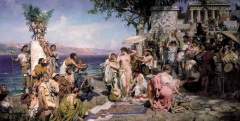 Цифровая репродукция этой картины находится в интернет-галерее http://gallerix.ru In the same year that he sent Paulus to Britain, Constantius appointed his cousin Julian to be Caesar ( not Augustus) in the west.
Цифровая репродукция этой картины находится в интернет-галерее http://gallerix.ru In the same year that he sent Paulus to Britain, Constantius appointed his cousin Julian to be Caesar ( not Augustus) in the west.
After his appointment it became obvious that Justin himself was a pagan. He is known to history as “the Apostate”.
In 360 the western army, probably the survivors of Mons Secleus, acclaimed Justin as Emperor and they marched against Constantius. There was no battle as Constantius died before Justin’s army reached him.
One of Julian’s first acts after he had exerted control was to search out Paulus Catena, who was condemmed to death and burned alive, a punishment he had metered out to many others.
Julian then intervened to prevent the persecution of pagans and to re-establish pagan shrines. However in 363 Julian was killed in a war against the Parthians. His army, in the field, appointed Jovian as Emporer. Jovian died on his way back to Constantinople and the army held an election at which they chose Valantinian.
Valantian
 Valentian was the son of Gratianus. Now only thirteen years after his fathers estates had been confiscated Valentian became sole Emperor. He made himself Emporer of the West, presumably reclaiming his family estates. He appointed his brother Valens as Emporer of the East.
Valentian was the son of Gratianus. Now only thirteen years after his fathers estates had been confiscated Valentian became sole Emperor. He made himself Emporer of the West, presumably reclaiming his family estates. He appointed his brother Valens as Emporer of the East.
Valantinian is credited as being the last good emperor. He spent the majority of his time repelling Germanic invasions across the Rhine and Danube frontiers and improving defences along those frontiers. He was also distinguished by the fact that although he declared himself to be a christian, he prevented the persecution of those who worshipped the roman and celtic gods.
